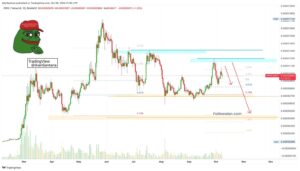
MASAYOSHI SON is a man of contrasting superlatives. At the height of the dotcom bubble in early 2000 the Japanese technology mogul was briefly the world’s richest person, before losing $77bn in paper wealth, more than anyone before. In 2021 SoftBank Group, his telecoms-and-software conglomerate turned investment powerhouse, reported the biggest annual net profit in the history of Japan Inc, followed a year later by the second-biggest loss. His $20m wager in 2000 on Alibaba, a tatty online marketplace that grew into China’s mightiest e-emporium, counts as one of the best in the annals of venture capital (VC); his later $16bn punt on WeWork, an office-rental startup with tech pretensions, is an all-time dud. He has been called a “genius” and “dumb money”.
Such wild swings of fortune would wear anyone out. And in November 2022 they exhausted even the indefatigable Masa, as the billionaire is known. On an earnings call the then 65-year-old announced that though he would remain in charge, future updates on SoftBank’s finances and strategy would be presented by his chief financial officer. This was out of character for a hyperactive bundle of vanity who has unironically likened himself to Napoleon. And, like the Corsican’s periodic retreats, it did not last. In June a re-energised Mr Son told an audience of SoftBank’s shareholders that all his past wagers were “a warm-up for my great dream to realise artificial superintelligence”.
To get the main act going, on October 2nd SoftBank splurged $500m on a tiny stake in OpenAI, in a $6.6bn funding round that valued the world’s leading generative-AI model-maker at $157bn. Earlier Mr Son put a similar sum in Wayve, a self-driving car startup, a smaller one in Perplexity, a gen-AI search engine, and talked of raising much larger amounts—perhaps $100bn—to build a rival to Nvidia, the champion of AI chips. After mentioning AI more than 500 times in earnings presentations between 2017 and 2020, Mr Son is getting down to business. He looks hopelessly late.
That seems odd for someone who tends to gaze far into the future. Aged 19 he drew up a 50-year plan to build a corporate empire; in his 50s he stretched the horizon out to 300 years. Throughout his life, chronicled in “Gambling Man”, an engaging new biography by Lionel Barber, former editor of the Financial Times, looking ahead was often preferable to contemplating the there and then. His earliest memories are suffused with the stench of pigs his family reared to make ends meet. Disdain from native Japanese, in whose eyes ethnic Koreans like him were second-class citizens, lingered long after his father turned pork profits into a thriving gambling business, which bankrolled young Masa’s desire to complete high school and university in California. Even a brush with death, from hepatitis in the mid-1980s, and two with bankruptcy—in the dotcom crash and the financial crisis of 2007-09—did little to elevate the here and now in Mr Son’s estimation.
At times inveterate futurism paid off. It alerted him early to the promise of software, the internet and smartphones, each of which made him a fortune and, more deliciously given the discrimination his family endured, shook up Japan’s stolid corporate establishment. On these big things he has been “spectacularly right”, says Alok Sama, a former Morgan Stanley banker who worked for Mr Son between 2014 and 2019. Yet a fixation on the future can obscure aspects of the present, over which he keeps tripping up.
One blind spot is politics. His $22bn takeover in 2013 of Sprint was predicated on a merger with T-Mobile, another wireless provider, which the Obama administration blocked. Though the deal went ahead under Donald Trump, Mr Son called his misreading of the regulators “one of the biggest mistakes of my life”.
If so, he did not learn from it. In 2020-21 he was caught out by a crackdown on tech in China, where SoftBank is the biggest foreign venture investor. Bets on firms like Didi, a ride-hailing giant, soured. Its stake in Alibaba lost two-thirds of its value. In 2022 trustbusters blocked the $40bn sale of Arm, a chip-designer SoftBank bought in 2016 for $32bn, to Nvidia. The rift between China and the West is engulfing TikTok and could hurt the $230bn valuation of its Chinese parent, ByteDance, in which SoftBank is a shareholder. America, where SoftBank makes a lot of its investments, may look askance at a firm that is teaming up with Alat, a Saudi industrial-automation venture that also has ties to a blacklisted Chinese maker of surveillance gear.
Mr Son is likewise inattentive to profitability. Growth, his idée fixe, is all well and good. But a business needs steady returns if it is to be a going concern, let alone last three centuries. In their absence SoftBank relies on borrowed money. Despite paying down a chunk of this lately with proceeds from the sale of Alibaba shares and the flotation of Arm, it still ranks as the world’s 11th-most-indebted non-financial firm—and has stakes in two of the top ten, Deutsche Telecom and T-Mobile. The gyrating price of SoftBank stock, against which some debt is secured, could mean margin calls whenever markets wobble. This ties Mr Son’s hands precisely when he could be buying up stocks and startups on the cheap.
The curse of long-sightedness
Instead, he often mistimes bets and overpays. SoftBank’s $100bn Vision Fund, the biggest in VC history and stuffed with money from the Gulf, went shopping in the late 2010s when valuations of startups like WeWork were especially frothy. In 2019 the vehicle sold its entire 5% stake in Nvidia for $3.6bn; today it would fetch $160bn. SoftBank backed OpenAI in the same round as Fidelity, a lumbering asset manager. “Tells you everything,” sneers a VC veteran. Investors in SoftBank are scathing in their own way. Its shares trade at more than a 50% discount to the net value of its assets, implying a lack of faith in Mr Son’s futurology. Minding your feet can be as important as admiring the horizon. ■
Subscribers to The Economist can sign up to our new Opinion newsletter, which brings together the best of our leaders, columns, guest essays and reader correspondence.















